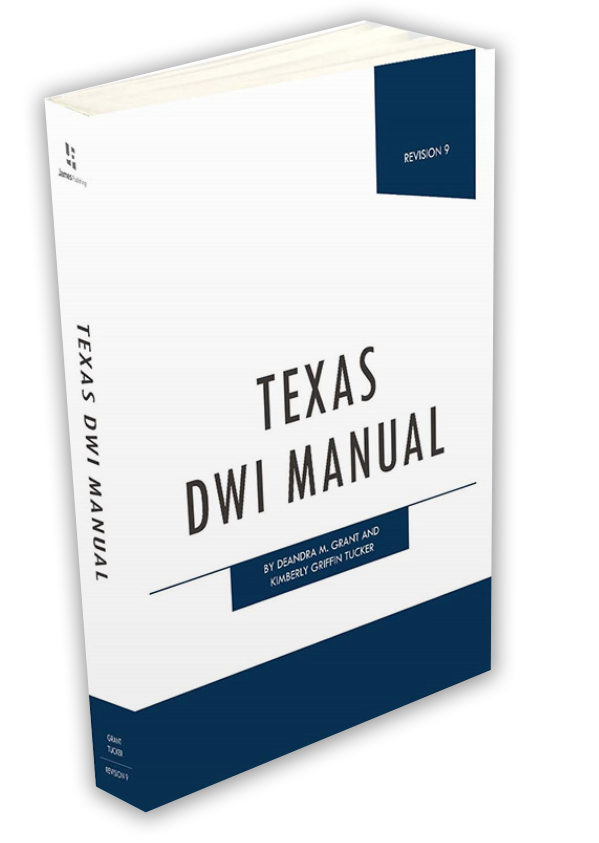
Free Consultation
(817) 631-6522
Do You Need Legal Help?

"Deandra Grant Law fights hard for their clients and is always willing to go above and beyond. They are the best firm for DWI cases in DFW and beyond. Definitely hire them to represent you in any pending cases."
- P. Williams

"Deandra Grant made a tough situation so much better. She listened to my concerns and helped me so much with my case. I would recommend her to anyone needing legal services."
- M. Haley

"Deandra Grant Law handled my case with diligence and professionalism. Deandra Grant's reputation is stellar and now I know why. She has a team of individuals who provide quality service."
- N. Coulter
As Seen On





A Fighting Team On Your Side
Since 1994 when our doors opened, Deandra Grant Law has helped thousands of clients get their DWI charges reduced or dismissed. We're ready to fight on your behalf.

Managing Partner
Partner & Criminal Division Chief
Criminal Division Senior Associate
Criminal Division DWI Trial Chief
Immigration Division Chief & Criminal Division Deputy Chief
Criminal Division Associate

Texas DWI Manual
By Attorney Deandra Grant
Fighting DWI charges can present many challenges, not only for the defense, but prosecutors as well. This is why it is important to be armed with the necessary knowledge so you understand the DWI process.
Attorney Deandra M. Grant is the co-author of the Texas DWI Manual, offering legal advice to both clients and fellow attorneys. Fighting DWI charges can present may challenges, not only for the defense, but prosecutors as well. This is why it is important to be armed with the necessary knowledge so that you understand the DWI criminal process.
Learn MoreFort Worth DWI and Criminal Defense Lawyers
Facing a DWI or Criminal Charge in Fort Worth, TX? Our Experienced Defense Lawyers are Here to Help
If you’ve found your way to this page, chances are you or someone you care about is facing a challenging situation – a DWI or criminal charge in Fort Worth, TX. The experienced Fort Worth DWI and Criminal Defense Lawyers at Deandra Grant Law understands the worry and uncertainty that can come with such situations. We are here to offer our expertise, support, and commitment to help you navigate through these difficult times.
Why You Need our Skilled Fort Worth DWI and Criminal Defense Lawyers
Being arrested for a DWI (Driving While Intoxicated) or any criminal offense can have serious consequences that extend far beyond the legal system. Your reputation, career, and future opportunities may be at stake. This is why it’s crucial to have a dedicated legal advocate by your side – someone who knows the ins and outs of the law, the local court system, and has a proven track record of successfully defending clients.
At Deandra Grant Law, we specialize in both DWI defense and criminal defense, and our Fort Worth DWI and Criminal Defense Lawyers have a deep understanding of the nuances and complexities of Texas law. With years of experience, we have helped countless individuals facing a wide range of DWI and criminal charges secure a positive outcomes.
Comprehensive DWI Defense
Our firm is well-equipped to handle various types of DWI charges, including:
-
BWI (Boating While Intoxicated): Defending you against charges related to operating a watercraft while under the influence.
-
CDL DWI: Protecting commercial driver’s license holders from the potential career-threatening consequences of a DWI charge.
-
Felony DWI: Skillfully addressing the heightened penalties associated with multiple DWI convictions or accidents resulting in serious injury or death.
-
Hit and Run DWI: Offering strategic defense strategies when a DWI incident involves a hit-and-run.
-
Multiple DWIs: Assisting individuals facing increased penalties due to multiple DWI convictions.
-
Underage DWI: Providing strong advocacy for those under the legal drinking age who are charged with DWI offenses.
Adept Criminal Defense
Our experience extends beyond DWI cases. We are prepared to defend clients facing a variety of criminal charges, including but not limited to:
-
Drug Crimes: Crafting a strong defense against charges related to possession, distribution, or trafficking of controlled substances.
-
Murder: Strategically representing clients accused of homicide, with a commitment to preserving their rights and pursuing justice.
-
Theft and Robbery: Offering skilled defense strategies to mitigate the consequences of theft and robbery charges.
-
White-Collar Crimes: Protecting the rights and reputation of individuals facing allegations of financial and white-collar crimes.
Why Choose Deandra Grant Law
When you partner with our firm, you’re not just hiring legal representation – you’re gaining a dedicated team that genuinely cares about your well-being. We approach each case with empathy, respect, and a determination to achieve a positive outcome for you. Our Fort Worth DWI and Criminal Defense Lawyers will take the time to understand the unique details of your situation, and we’ll work tirelessly to build a strong defense strategy tailored to your needs.
Don’t face these challenging times alone. Trust Deandra Grant Law to stand by your side, protect your rights, and fight for your future. Contact us today for a confidential consultation, and let us show you how we can make a difference in your DWI or criminal defense case.
Important Criminal Videos
Choosing a criminal defense attorney
Why shouldn’t I use a court ordered attorney
Your rights after a drug crime arrest
Steps to take after a drug crime arrest
How can an attorney help me with a warrant?
Consequences of marijuana possession
How long does a criminal defense case take?
Navigating Potential Criminal Charges in Fort Worth, TX: Your Guide from Deandra Grant Law
If you or someone you know has been arrested for a crime in Fort Worth, TX, it’s important to understand the potential criminal charges you might be facing. At Deandra Grant Law, we are here to provide you with clear and concise information about various charges you could encounter. Our goal is to empower you with knowledge so you can make informed decisions about your next steps.
1. Drug Crimes: Know Your Rights
Drug-related charges involve possessing, distributing, or manufacturing illegal substances. These charges can come with serious consequences. It’s important to know your rights and options when dealing with drug crime charges. Our experienced team can guide you through the legal process and help build a strong defense tailored to your case.
2. Theft and Robbery: Protecting Your Future
Theft charges cover instances where property is taken without permission. Robbery involves using force or fear to take something from someone. These charges can range from minor to major offenses, each with potential consequences. Our skilled attorneys are dedicated to protecting your future and ensuring you receive fair treatment under the law.
3. Assault and Battery: Defending Your Rights
Assault and battery charges involve hurting or threatening to hurt someone else. The severity of these charges can vary, and it’s essential to have a legal team that understands the nuances of your situation. Our team is here to help you navigate through the legal process, ensuring your rights are upheld.
4. White-Collar Crimes: Understanding Complex Charges
White-collar crimes like fraud, embezzlement, and identity theft are often complex and involve financial deception. These charges can lead to substantial penalties and damage to your reputation. Our knowledgeable attorneys have the expertise to unravel these complexities and provide you with a strong defense.
5. Homicide: Facing Serious Consequences
Homicide charges, including manslaughter and murder, are among the most serious criminal charges. They can result in severe consequences, affecting your life and the lives of your loved ones. Our compassionate team is here to support you and provide a robust defense strategy to protect your rights.
6. Sexual Offenses: Navigating Sensitive Cases
Sexual offense charges, such as sexual assault or indecent exposure, are sensitive and can have lasting effects. These charges often come with social stigma and legal consequences. Our dedicated attorneys approach these cases with sensitivity and expertise, ensuring your rights are upheld throughout the legal process.
7. Other Criminal Charges: Your Advocates in Various Cases
Aside from the charges mentioned above, our seasoned legal team is equipped to handle a wide range of criminal cases, including domestic violence, fraud, weapons offenses, and more. We understand that each case is unique, and we are committed to tailoring our approach to your specific situation.
Trust Deandra Grant Law for Your Criminal Defense Needs
Facing criminal charges can be daunting, but you don’t have to navigate this journey alone. Deandra Grant Law is here to provide you with the support, knowledge, and expertise you need to make informed decisions about your case. Contact us today for a confidential consultation and take the first step towards securing a strong defense strategy that prioritizes your rights and future.
Frequently Asked Questions for Those Recently Arrested in Fort Worth, TX
Facing an arrest can be a confusing and stressful experience. To help you navigate through this challenging time, we’ve compiled a list of frequently asked questions to provide you with some clarity. Remember, every case is unique, so it’s essential to consult with a legal professional for personalized advice regarding your specific situation.
You have several rights when you are arrested, including the right to remain silent, the right to an attorney, and the right to know the charges against you. You should exercise your right to remain silent until you have an attorney present to guide you through the legal process.
If you’re arrested, it’s important to stay calm and comply with law enforcement’s instructions. Avoid making any statements or admissions without an attorney present. Remember the details of the events leading up to your arrest, as this information can be valuable later.
Yes, you have the right to remain silent when questioned by the police. You can politely inform them that you choose to exercise your right to remain silent until you have legal representation.
After an arrest, you will go through the booking process, which involves recording your personal information, taking your photograph and fingerprints, and searching your belongings. You’ll likely be informed of your charges and possibly given the opportunity to post bail.
Yes, it’s recommended to consult with an attorney regardless of your innocence. A skilled attorney can protect your rights, guide you through legal proceedings, and build a strong defense to ensure a positive outcome for your case.
The consequences of an arrest can vary depending on the charges. You could face fines, probation, license suspension, or even jail time. It’s crucial to understand the potential outcomes and take appropriate steps to defend yourself.
An experienced attorney can help you in various ways, such as explaining your rights, building a defense strategy, negotiating with prosecutors, and representing you in court. They will work to achieve a positive outcome for your case.
If you can’t afford an attorney, you may be eligible for a court-appointed lawyer. This lawyer, known as a public defender, will represent you based on your financial situation.
The decision to accept a plea bargain should be made in consultation with your attorney. They can advise you on whether the offer is fair and in your best interest or if pursuing a trial is a better option.
To fully understand your case and the potential outcomes, schedule a consultation with our experienced attorneys. We can review the details of your situation and provide personalized guidance.
Understanding DWI Charges in Fort Worth, TX
If you or someone you know has recently been arrested for Driving While Intoxicated (DWI) in Fort Worth, Texas, it’s important to understand the legal implications and the potential consequences that lie ahead. A DWI charge is a serious matter that can have lasting effects on your life. In this article, we will break down the key aspects of DWI charges in Fort Worth and provide you with the information you need to make informed decisions.
What is a DWI Charge?
A DWI charge, short for Driving While Intoxicated, is a legal offense that occurs when a person operates a motor vehicle while under the influence of alcohol or drugs to the extent that their normal faculties are impaired. In Fort Worth, as in the rest of Texas, the legal blood alcohol concentration (BAC) limit is 0.08%. This means that if your BAC level is found to be 0.08% or higher, you could be charged with a DWI.
Immediate Consequences of a DWI Arrest
Upon being arrested for a DWI in Fort Worth, several immediate consequences can occur:
-
Driver’s License Suspension: Your driver’s license could be suspended if you fail or refuse a blood alcohol test. This is known as the Administrative License Revocation (ALR) process.
-
Booking and Bail: You will be taken to a local law enforcement facility for booking, where your personal information will be recorded. Depending on the situation, you may need to post bail to be released from custody.
-
Vehicle Impoundment: Your vehicle might be impounded, and you’ll need to navigate the process of retrieving it.
Potential Penalties for a DWI Conviction
If you are convicted of a DWI in Fort Worth, you could face various penalties, which may include:
-
Fines: DWI fines can range from hundreds to thousands of dollars, depending on the circumstances of your case.
-
Jail Time: A DWI conviction can lead to incarceration, with sentences varying based on prior convictions and other factors.
-
Probation: Instead of jail time, you might be placed on probation, during which you’ll need to adhere to certain conditions.
-
License Suspension: Your driver’s license could be suspended, making it challenging to commute and carry out daily activities.
Seeking Legal Representation
If you’re facing a DWI charge in Fort Worth, it’s crucial to seek legal representation from an experienced attorney who specializes in DWI cases. A knowledgeable attorney can:
-
Explain Your Rights: Your attorney will ensure you understand your rights at every stage of the legal process.
-
Build a Defense Strategy: Your attorney will review the evidence, interview witnesses, and work to build a strong defense on your behalf.
-
Negotiate on Your Behalf: Your attorney can negotiate with prosecutors to potentially reduce charges or penalties.
Taking Action
Facing a DWI charge can be overwhelming, but it’s important to take action promptly. Here’s what you can do:
-
Consult an Attorney: Reach out to a reputable DWI attorney in Fort Worth to discuss your case and explore your options.
-
Document the Details: Write down everything you remember about the events leading up to your arrest while the memories are fresh.
-
Attend Hearings: Be sure to attend all required court hearings and meetings related to your case.
A DWI charge in Fort Worth, TX, is a serious matter with potential legal, financial, and personal consequences. By understanding the charges, seeking legal representation, and taking appropriate actions, you can work towards a positive outcome for your situation. Remember, every case is unique, and consulting a skilled attorney is the first step towards navigating this challenging process.
Recent Blogs
Get Experienced Legal Support for Your Fort Worth DWI or Criminal Case
If you’re facing a DWI or criminal charge in Fort Worth, TX, you don’t have to navigate the legal system alone. At Deandra Grant Law, we are dedicated to providing you with the strong legal representation you need during this challenging time. With our extensive experience in criminal defense, including DWI cases, we are well-equipped to guide you through the legal process and fight for a positive outcome.
Why Choose Deandra Grant Law?
When it comes to protecting your rights and securing your future, choosing the right legal team is essential. Here’s why Deandra Grant Law stands out:
-
Experience: With years of experience in criminal defense and DWI cases in Fort Worth, we have an in-depth understanding of local laws and procedures. Our track record of successful outcomes speaks for itself.
-
Compassion: We understand that facing a DWI or criminal charge can be overwhelming. Our team is here not only as your legal advocates but also as your compassionate allies, offering support and guidance every step of the way.
-
Free Consultations: We offer free initial consultations to discuss the specifics of your case. This is an opportunity for you to share your situation, ask questions, and gain insight into how we can build a strong defense strategy tailored to your needs.
-
Personalized Approach: Every case is unique, and we believe in tailoring our approach to suit your individual circumstances. Our team will take the time to listen to your story and craft a defense strategy that addresses your concerns and objectives.
-
Dedication to Excellence: At Deandra Grant Law, we are committed to pursuing excellence in everything we do. Our goal is to achieve a positive outcome for your case, whether through negotiation, litigation, or alternative solutions.
Contact Us Today for Your Free Consultation
Your future is too important to leave to chance. If you’ve been arrested for a DWI or criminal offense in Fort Worth, TX, Deandra Grant Law is here to stand by your side. Our skilled legal team will work tirelessly to protect your rights, preserve your reputation, and help you move forward from this difficult situation.
To get started, reach out to us today to schedule your free consultation. Don’t delay—the sooner you have a seasoned legal advocate on your side, the better your chances of securing a positive outcome. Contact Deandra Grant Law and take the first step towards a brighter future.
Client Reviews
![]()
“Deandra Grant Law handled my case with diligence and professionalism. Deandra Grant’s reputation is stellar and now I know why. She has a team of individuals who provide quality service.”















